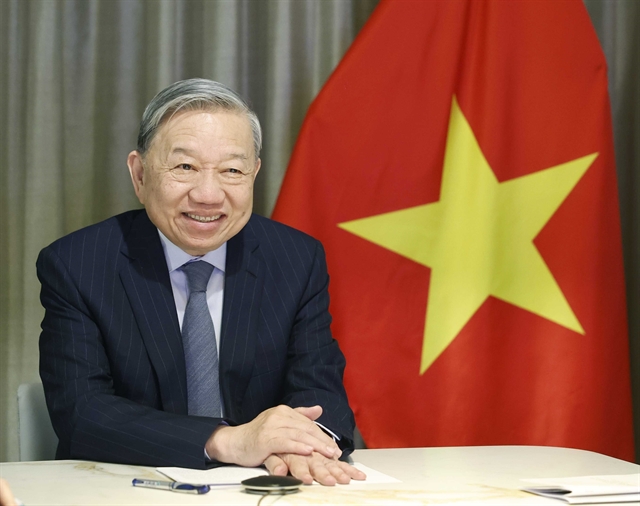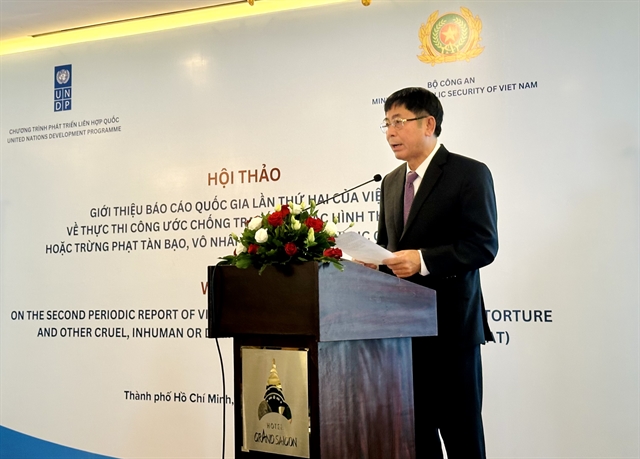 Politics & Law
Politics & Law

 |
| A workshop on the second periodic report of Việt Nam under the Convention against Torture and other cruel, inhuman or degrading treatment or punishment was organised in HCM City on November 28. — VNS Photo Nguyễn Diệp |
HCM CITY — Việt Nam is committed to its responsibilities as a member of the Convention against Torture (CAT), Major General Nguyễn Văn Kỷ, deputy director of the Foreign Relations Department at the Ministry of Public Security, said at a workshop held in HCM City on Thursday (November 28).
The workshop discussed the second periodic report of Việt Nam under the Convention against Torture (CAT) and other cruel, inhuman or degrading treatment or punishment. It was organised by the Ministry of Public Security in collaboration with the United Nations Development Programme (UNDP).
Nguyễn Văn Kỷ and Sabina Stein, Assistant Resident Representative, head of Governance and Participation of UNDP Việt Nam, co-chaired the workshop.
The event brought together about 80 representatives from relevant ministries, departments, agencies and universities, along with UNDP officials and international organisations.
It served as a platform to present Việt Nam’s latest national report, discuss progress in fulfilling its obligations under CAT, and gather expert feedback to enhance future efforts.
Speaking at the workshop, Major General Kỷ highlighted Việt Nam’s responsibilities as a member of CAT since 2015, noting that the country has submitted three national reports to the CAT Committee, with the most recent report awaiting review.
“Raising public awareness about the report’s findings and the country’s achievements in ensuring human rights protections during the implementation of the convention is also important,” he said.
 |
| Major General Nguyễn Văn Kỷ, deputy director of the Foreign Relations Department at the Ministry of Public Security, gives a speech at the workshop. — VNS Photo Nguyễn Diệp |
Stein said submitting periodic reports is a core responsibility for member states under Article 19 of the Convention.
“The reports are a crucial way for countries to demonstrate their actions to respect, protect, and fulfill the human rights stipulated in the Convention,” she said.
Submitting two reports since ratifying the Convention in 2015 reaffirms Việt Nam's commitment to fulfilling its obligations as a responsible member state of the United Nations.
Since the Convention came into force 40 years ago, the principle of absolute prohibition against torture has evolved into a widely accepted standard of customary international law.
This universal commitment is evident in the Convention’s large membership.
With 174 States Parties, CAT is one of the most widely supported international human rights treaties.
Countries have come to agree that no one shall be subjected to torture or to cruel, inhuman, or degrading treatment or punishment.
“Việt Nam, like other member states, has undertaken its own journey in making these rights a reality within its borders,” she said.
The right to not be subjected to torture and cruel, inhumane, or degrading punishment is enshrined in Article 20 of Việt Nam’s 2013 Constitution.
It is further reinforced in a wide range of legal documents across criminal, administrative and civil laws.
However, obligations of member states toward international human rights treaty bodies, including the CAT, go beyond mere review and reporting responsibility.
Its ultimate goal is to identify areas for improvement and to take concrete actions to translate these rights on paper into meaningful improvements in people’s lives.
Stein said UNDP welcomes Decision No. 87, issued in 2023 by the Prime Minister to accelerate CAT implementation and recommendations of the CAT Committee nationwide.
The Decision defined an action plan and assigned specific tasks to each government agency to implement the convention.
Efforts to eradicate torture must first and foremost focus on prevention, which requires a holistic approach, combining education and capacity building with various legislative, administrative, judicial, and supervising measures, she said.
“A whole-of-government and whole-of-society approach is so important,” she said.
Active participation, genuine dialogue, and cooperation among various government sectors, subject matter experts and socio-political organisations are vital to promoting and protecting human rights on the ground, she said.
“Such collaboration plays a critical role in preventing acts of torture before they occur,” she said.
 |
| Sabina Stein, Assistant Resident Representative - head of Governance and Participation of UNDP Việt Nam, at the workshop. — VNS Photo Nguyễn Diệp |
UNDP accompanied an MPS delegation to Geneva for technical discussions with the CAT Committee and Geneva-based UN entities earlier this month.
It remains committed to supporting the Ministry in its efforts to implement the Convention’s provisions.
She also reiterated UNDP’s unwavering commitment, alongside the entire UN, to support the Vietnamese Government’s efforts in implementing CAT and ensuring the realisation of the rights of all people in Việt Nam.
During the workshop, officials from various agencies delivered eight presentations on key aspects of CAT implementation.
These included aligning Việt Nam’s legal framework with CAT principles, raising awareness about the Convention, safeguarding human rights in detention and custody facilities, and ensuring compliance with international human rights commitments.
In his closing remarks, Colonel Ngô Đức Thắng, deputy director general of the Department of Legal Affairs and Administrative-Judicial Reforms under the Ministry of Public Security, expressed high appreciation for the valuable contributions of experts and international partners, including the support of UNDP, in raising critical issues and providing recommendations to further enhance Việt Nam’s implementation of the Convention. — VNS




